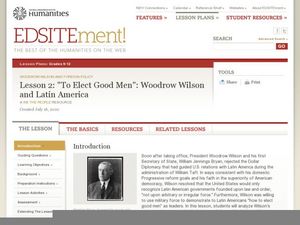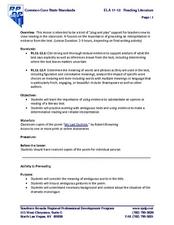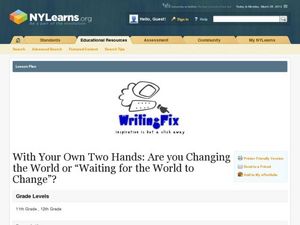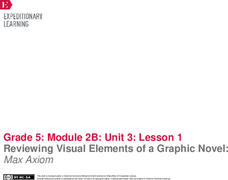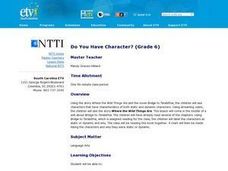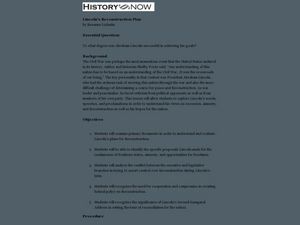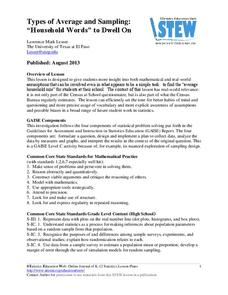Curated OER
Thinking Out Loud
Students share opinions about whether a series of statements from the internet constitute facts or opinions. They read and analyze blogs published in on the web in order to understand the use of fact, opinion, and tone of voice when...
Curated OER
Lesson 2: "To Elect Good Men": Woodrow Wilson and Latin America
Students analyze Woodrow Wilson's foreign policy. In this foreign policy lesson, students examine how the Wilson administration responded to civil unrest in Latin America.
Curated OER
Media Literacy Unit - Part 4
Seventh graders study how advertisers use techniques to sell their products. In this persuasive media lesson, 7th graders analyze media messages to find the advertiser's purpose. They examine different advertising techniques and their...
Curated OER
Renaissance Realities
Students analyze passages by Niccolo Machiavelli and Francis Bacon as an analysis of Renaissance ideas in contemporary situations. In this Renaissance writings lesson, students read excerpts from Machiavelli's The Prince and multiple...
Curated OER
Model Lesson Plans
Ninth graders study how to identify and analyze the use of figurative language used in selected poems, short stories or other pieces of prose chosen by the teacher. These pieces of literature represent at least two pieces by one writer...
Curated OER
Promoting the South Carolina Junior Book Award Nominees
Sixth graders recongize and analyze different components of a piece of literature. They must also practice their oral communcation skills by reading a book to an audience.
Curated OER
Concert Suite from Dances With Wolves
Students complete a unit of lessons that prepares them to perform, 'Concert Suite From Dances With Wolves,' at a public performance. They analyze the emotions depicted by music, view excerpts from the movie, and perform the music.
Curated OER
Silent Spring
Students read background information about Rachel Carson found on the listed website links. They analyze and answer questions about her work and how it is linked to science then they research pesticide usage and alternative methods.
Curated OER
Ornithology and Real World Science
Double click that mouse because you just found an amazing lesson! This cross-curricular Ornithology lesson incorporates literature, writing, reading informational text, data collection, scientific inquiry, Internet research, art, and...
Southern Nevada Regional Professional Development Program
Reading Literature - My Last Dutchess
Draw back the curtain, add a spot of joy to your class, and let learners be instructional activityed by a close reading exercise that models how to develop an interpretation based on evidence drawn from a text. Robert Browning’s dramatic...
PBS
Journalism Ethics
As a journalist, would you publish everything you heard or saw? Discuss the ethics of journalism with a lesson plan from PBS. Young reporters imagine themselves to be the editor of their school's newspaper, and as they read five...
Curated OER
Post-Colonial Writers Unit
How do cultural and historical background impact thought? To explore this essential question, class members view of portion of the film, The Passage to India, read an excerpt from The Magician’s Nephew, and Nissim Ezekiel’s poem, "In...
Curated OER
Oliver Twist Goes to Hollywood
How does Oliver Twist, the novel written by Charles Dickens, compare with its screenplay adaptation? Although the activity doesn't require learners to have read the novel, the similarities and differences of the highlighted passages...
Curated OER
What Are the Advantages and Disadvantages of Conforming?
Dive into Arthur Miller’s The Crucible and determine what it means to conform in society, and discuss as a group with the thoughts and plans available in these documents. Included are multiple activities and brain targets that form the...
Ford's Theatre
How Perspective Shapes Understanding of History
The Boston Massacre may be an iconic event in American history, but perhaps the British soldiers had another point of view. Using primary sources, including reports from Boston newspapers and secondary sources from the British...
Curated OER
With Your Own Two Hands: Are You Changing the World or "Waiting for the World to Change"?
Can your pupils change the world? Explore this question with Ben Harper's song "With My Own Two Hands" and John Mayer's "Waiting for the World to Change." After listening to the songs, they discuss the tools at their disposal for...
Southern Nevada Regional Professional Development Program
Close Reading in the Classroom
Close reading is key to the analysis and interpretation of literature. A close reading of the title and the epigraph of “The Love Song of J. Alfred Prufrock” offers readers an opportunity to examine how even single words or names can...
Southern Nevada Regional Professional Development Program
Reading Literature - The Ruin
Cross-comparison, the technique of focusing on two different texts with the same themes, motifs, events, etc., is employed in an exercise that asks groups to examine two different translations of “The Ruin,” a poem, written in Old...
Curated OER
Phineas Gage: Questioning Strategy
Focus on chapter two of Phineas Gage: A Gruesome but True Story About Brain Science with a questioning activity. After teaching and modeling several types of questions, learners work with partners and then independently to answer and...
Maryland Department of Education
The Concept of Identity Lesson 2: The Historical/Biographical Approach
"How does our environment shape our identity?" After researching biographical information about John Knowles and considering how these experiences are reflected in A Separate Peace, class members consider the strengths and weaknesses of...
EngageNY
Reviewing Visual Elements of a Graphic Novel: Max Axiom
Pass the tea! Using the resource, scholars participate in a Tea Party protocol to analyze text and images about inventions that helped meet societal demands. After sharing their observations with each other, they discuss visual elements...
Curated OER
Do You Have Character?
Sixth graders read Katherine Paterson's novel, Bridge to Terabithia, and watch a video of Maurice Sendak's book, Where the Wild Things Are. They examine the characters in both stories that share similar characteristics. Students use the...
Curated OER
Lincoln's Reconstruction Plan
High schoolers explore Lincoln's Reconstruction plan. For this Reconstruction lesson, students examine Lincoln's speeches and writings on bringing the country back together following the war.
Statistics Education Web
Types of Average Sampling: "Household Words" to Dwell On
Show your classes how different means can represent the same data. Individuals collect household size data and calculate the mean. Pupils learn how handling of the data influences the value of the mean.



